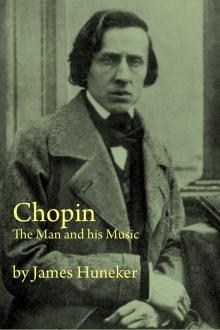Chopin: The Man and His Music by James Huneker (cat reading book txt) 📕

- Author: James Huneker
- Performer: -
Book online «Chopin: The Man and His Music by James Huneker (cat reading book txt) 📕». Author James Huneker
tells me he has the piece and that it is weak, having historic interest only. I cannot find much about the Polish poet, Julius Slowacki, who died the same year, 1849, as Edgar Allan Poe. Tarnowski declares him to have been Chopin's warmest friend and in his poetry a starting point of inspiration for the composer.
In July 1829, accompanied by two friends, Chopin started for Vienna. Travelling in a delightful, old-fashioned manner, the party saw much of the country--Galicia, Upper Silesia and Moravia--the Polish Switzerland. On July 31 they arrived in the Austrian capital. Then Chopin first began to enjoy an artistic atmosphere, to live less parochially. His home life, sweet and tranquil as it was, could not fail to hurt him as artist; he was flattered and coddled and doubtless the touch of effeminacy in his person was fostered. In Vienna the life was gayer, freer and infinitely more artistic than in Warsaw. He met every one worth knowing in the artistic world and his letters at that period are positive
Free e-book «Chopin: The Man and His Music by James Huneker (cat reading book txt) 📕» - read online now
Similar e-books:





Comments (0)